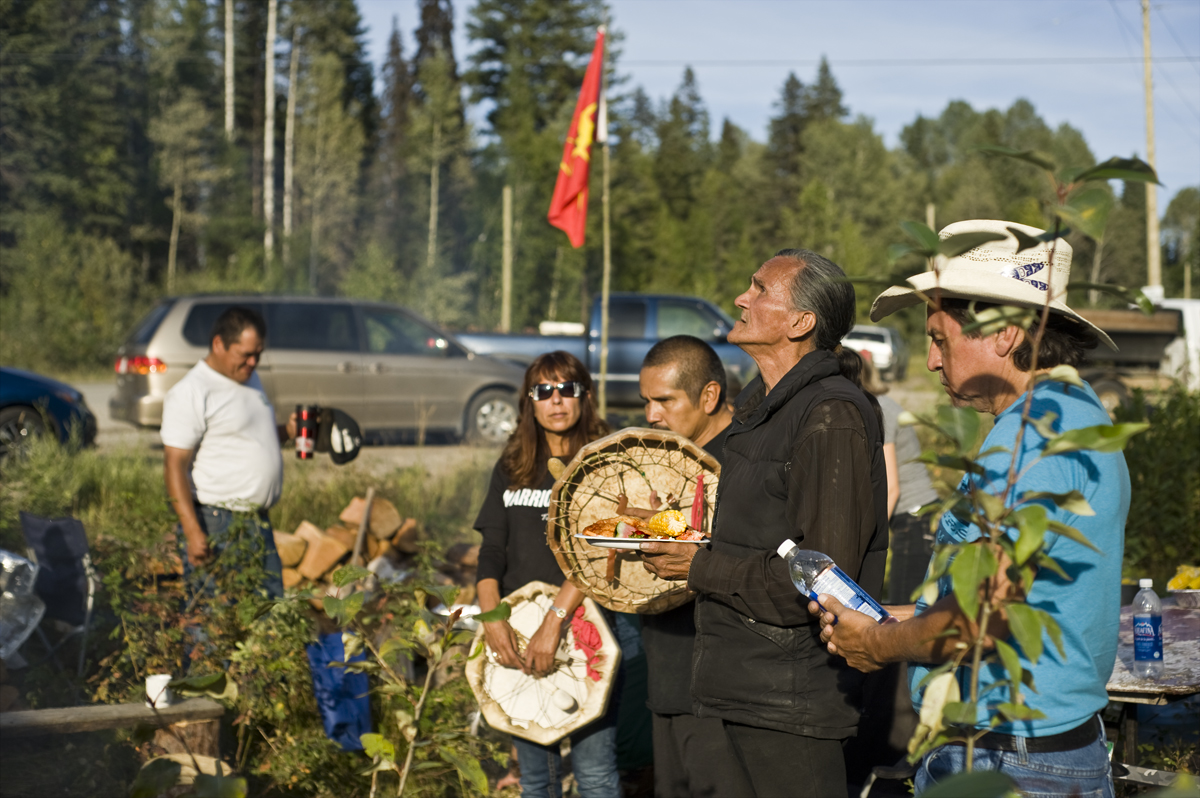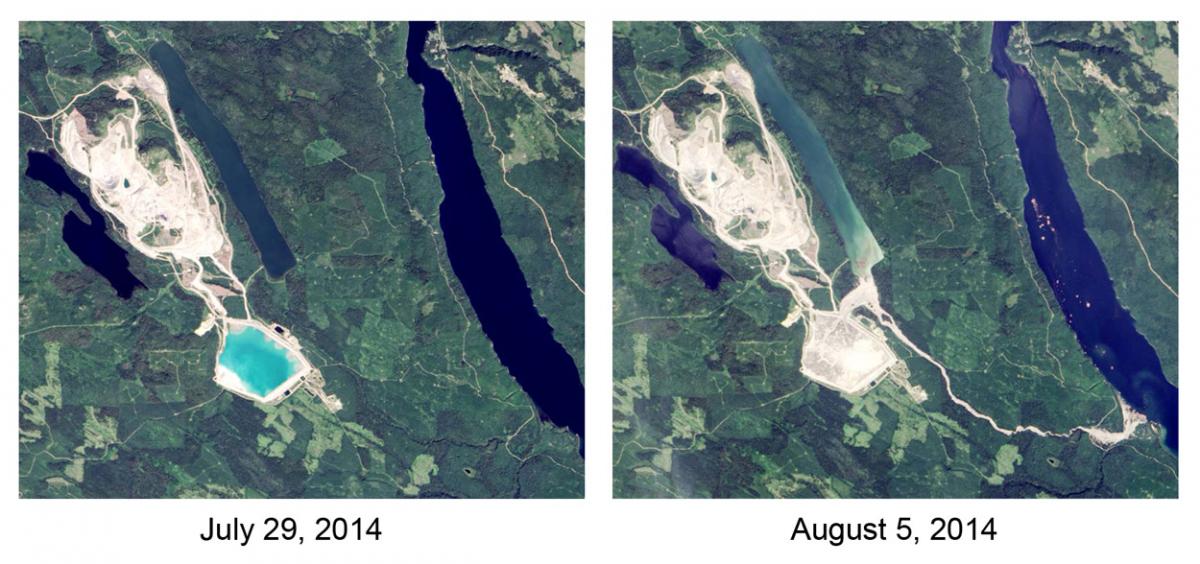It’s been four long years since the Mount Polley copper mine breached its tailings pond, cutting a 9-kilometre path of destruction from the mine site to Quesnel Lake.
Path of desctruction: tailing spill down Hazeltine Creek. Credit: Richard Holmes
In the days following the disaster, long-time area residents and Indigenous peoples mourned together for the many species of trout and salmon, insect and animal that lived along Hazeltine Creek and in Quesnel Lake.

Day 5 of the Yuct Ne Senxiymetkwe Camp, established by Secwepemc women to bring together indigenous and settler commmunities in the wake of the August 2014 disaster. Credit: Kieran Oud
The question on everyone’s lips was, “have we lost our wild salmon and clean water forever?”. People who rely on wild salmon for their survival still don’t know the answer to that question. They want independent studies they can trust to determine that and in the meantime, they don’t want Mount Polley mine to continue discharging mining waste water into Quesnel Lake.
Christine McLean of Concerned Citizens of Quesnel Lake and Jacinda Mack of First Nations Women Advocating Responsible Mining, Williams Lake, BC. Credit: Amnesty International Canada
For the last four years, residents and Indigenous peoples have fought together tirelessly for justice. They continue to raise concerns about how the disaster has made them fearful of drinking water or eating fish from the lake. And they want the Federal government to conclude its ongoing criminal investigation into the disaster and to lay charges against those who are responsible. Four years is a long time to wait for justice, and the wait could take longer.
But people aren’t stilling still and waiting for answers.
Jacinda Mack delivering 40,000 SumofUS petition signatures to former Federal Energy and Mines Minister Jim Carr, 2017. Credit: MiningWatch Canada
Volunteers groups like the Concerned Citizens of Quesnel Lake pour over government and company data and raise the alarm when problems are found. The Secwepemc Women Warriors have shown up at company annual meetings every year since the disaster demanding Imperial Metals shareholders take responsibility. First Nations Women Advocating Responsible Mining have penned op-eds about the disaster and lack of accountability, travelled across the country to deliver petitions calling for justice for Mount Polley to the Federal Minister of Energy and Mines, and worked with academics to develop proposals aimed at bringing BC’s mining regulations in line with Canada’s human rights obligations.
Together they opposed Mount Polley’s application for a water discharge permit and condemned the BC government when the permit was granted despite near unanimous opposition.

Dozens of people harmed by the Mount Polley tailings dam collapse travelled to Williams Lake, BC in May 2017 to provide testimony to the UN Working Group on Business and Human Rights about the human rights impact of the disaster and to demand justice from Canada. Credit: Williams Lake Tribune
In May 2017, residents and downstream peoples came together to provide testimony to the UN Working Group on Business and Human Rights about the impact of the disaster and Canada’s failure to protect their human rights. The meeting took place in Secwepemc territory, in the city of Williams Lake.

Participants at the UN Committee for the Elimination of Racial Discrimination Meeting in Geneva, Switzerland, August 2017. Credit: Russell Diabo
In August 2017, Indigenous peoples took their concerns about Mount Polley to Geneva to the UN Committee for the Elimination of Racial Discrimination (CERD) during its session on Canada. Amnesty helped prepare a submission to the CERD committee about the human rights impacts of the Mount Polley disaster based on the testimonies given at May UN Working Group meeting in Williams Lake.
Both of these highly respected international bodies subsequently called on Canada to hold those responsible for the breach to account and to provide health monitoring, transparency, and food security to those who were harmed. More broadly, it called on Canada to implement the UN Declaration on the Rights of Indigenous Peoples without further delay.

Amnesty International Canada visits BC’s Ministry of Energy and Mines to discuss CERD recommendations. Credit: Amnesty International Canada
In September 2017, Alex Neve and I travelled to Victoria BC to share the CERD recommendations on Mount Polley with Justice Minister David Eby. We returned once again in May 2018 to discuss the recommendations with the Justice Minister as well as with the Ministries of Energy and Mines, Environment, and Indigenous Relations and Reconciliation.
To our great disappointment, the Province has yet to publicly acknowledge the UN recommendations.

Mount Polley tailings dam before and after the breach. Credit: Yuct Ne Senxiymetkwe Camp
The Federal government has also remained silent. Given Canada’s role as a global exporter of mining investment, Canada’s reluctance to provide justice for the worst environmental mining disaster in Canada’s history is mind-boggling and shows how far Canada has to go to live up to its own much-hyped reputation as a global corporate accountability leader.

Former Likely community member, Lawna Kuester, shows Quesnel Lake water tainted by mining sediment during a press conference, 2014. Credit: Damien Gillis
This week, as the fourth anniversary approaches, I’m reminded of the personal toll the Mount Polley mine disaster has taken on people who lived through it. Lawna Kuester (pictured above) and her husband, Larry, a former mine worker, spoke out publicly in the months after the disaster and campaigned tirelessly for justice. They took a lot of flak for speaking out. They eventually sold their home at a loss and moved away from Likely. But the anguish of living through the disaster stays with them. “For us, it was a horrible thing to happen in our lives. The disaster divided a community and things will never be the same. I would still like to see them held accountable for what they did to everyone,” says Lawna.
That feeling is echoed by the BC public who were shocked when the disaster happened. People continue to tell me how appalled they are that no one has been held accountable for Mount Polley.
Quesnel Lake is not only vital to Indigenous food security, it is a beautiful place that draws thousands of visitors every year. Horsefly Narrows, July 2018. Credit: Concerned Citizens of Quesnel Lake
On the eve of the fourth anniversary of the disaster, Amnesty International reiterates our solidarity with residents and Indigenous peoples calling for justice for the Mount Polley mine disaster. We are calling on the government of Canada to:
- Implement the 2017 CERD recommendations starting with the most immediate: make public any government health impact studies about the Mount Polley disaster as well as the results of the criminal investigation before the statute of limitations expires in on August 4, 2019.
- If the Mount Polley disaster violated the federal Fisheries Act, hold those responsible to account.
- Provide remedy and reparations to those harmed by the disaster in consultation with them.
- Implement the UN Declaration on the Rights of Indigenous Peoples and ensure that mining laws in all jurisdictions across Canada comply with Canada’s international human rights obligations.
Before he became BC’s Premier, as leader of the BC NDP, John Horgan visited the scene of the disaster and spoke out in support of those harmed, August 2014. Credit: Richard Holmes
We are also calling on British Columbia to show leadership and:
- Reform BC’s mining laws to bring them in line with Canada’s human rights obligations such as the UN Declaration on the Rights of Indigenous Peoples and the UN Guiding Principles on Business and Human Rights.
- Adopt the BC Auditor General’s recommendation to separate compliance enforcement from mine promotion and permitting.
- Ensure companies post full financial sureties to cover the full costs of mine remediation.
- Establish a super fund for accidents or disasters like the Mount Polley disaster.


Thousands of Canadians have signed our letter to Prime Minister Trudeau calling for Federal action. August, 2017. Credit: MiningWatch Canada
1. TAKE ACTION NOW
>>> Sign our online action to Prime Minister Trudeau
2. WATCH OUR VIDEO
>>> Watch and share our video about the 4th anniversary of the disaster
3. SHOW YOUR SOLIDARITY
>>> Show your love and solidarity by sending a message of support on a cut-out of a wild, BC salmon
4. TWEET YOUR SUPPORT
@JustinTrudeau it’s time for #JusticeforMountPolley Implement #CERD recommendations on the #MountPolley disaster now. 4 years is #toolongtowait @AICanadaBHR #bcpoli
— AmnestyCanada (@AmnestyNow) August 3, 2018





















